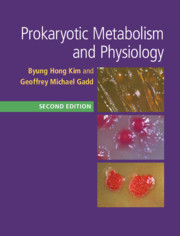Description
Prokaryotic Metabolism and Physiology (2nd Ed.)
Authors: Kim Byung Hong, Gadd Geoffrey Michael
Extensive and up-to-date review of key metabolic processes in bacteria and archaea and how metabolism is regulated under various conditions.
Language: English
Subject for Prokaryotic Metabolism and Physiology:
Approximative price 68.81 €
In Print (Delivery period: 14 days).
Add to cart
Prokaryotic Metabolism and Physiology
Publication date: 05-2019
504 p. · 18.8x24.6 cm · Paperback
Publication date: 05-2019
504 p. · 18.8x24.6 cm · Paperback
Approximative price 183.14 €
In Print (Delivery period: 14 days).
Add to cart
Prokaryotic Metabolism and Physiology
Publication date: 05-2019
504 p. · 19.5x25.3 cm · Hardback
Publication date: 05-2019
504 p. · 19.5x25.3 cm · Hardback
Description
/li>Contents
/li>Biography
/li>
Vast numbers of different prokaryotic microorganisms shape the biosphere, with diverse metabolic capabilities. Determination of genome sequences for a wide range of bacteria and archaea now requires an in-depth knowledge of prokaryotic metabolic function to give biochemical, physiological and ecological meaning to the genomic information. This new edition describes up-to-date knowledge of the key metabolic processes that occur under different conditions, and the cellular processes that determine prokaryotic roles in the environment, biotechnology and human health. Essential for students of microbiology, applied microbiology, biotechnology, genomics and systems biology, this advanced textbook covers prokaryotic structure, composition, nutrient transport, biosynthesis and growth. Newly characterised metabolic pathways are included, as well as the latest understanding of metabolic regulation and stress responses. Additionally, the link between energetics, growth and survival is discussed as well as the maintenance of genetic integrity by the bacterial immune system.
1. Introduction to bacterial physiology and metabolism; 2. Composition and structure of prokaryotic cells; 3. Membrane transport – nutrient uptake and protein excretion; 4. Glycolysis; 5. Tricarboxylic acid (TCA) cycle, electron transport and oxidative phosphorylation; 6. Biosynthesis and growth; 7. Heterotrophic metabolism on substrates other than glucose; 8. Anaerobic fermentation; 9. Anaerobic respiration; 10. Chemolithotrophy; 11. Photosynthesis; 12. Metabolic regulation; 13. Energy, environment and microbial survival.
Byung Hong Kim is Emeritus Research Scientist at Korea Institute of Science and Technology, Seoul, and Professor at the Fuel Cell Institute, National University of Malaysia. His research group was designated by the Korean Government as a National Research Laboratory, the Bioelectricity Laboratory, and he has served as President of the Korean Society for Microbiology and Biotechnology. He holds over twenty patents relating to applications of his research in environmental biotechnology.
Geoffrey Michael Gadd is Professor in the School of Life Sciences, University of Dundee. He holds the Boyd Baxter Chair of Biology, leads the Geomicrobiology Group and was founding Head of the Division of Molecular Microbiology at the University of Dundee. He has served as President of the British Mycological Society and is an elected Fellow of the Royal Society of Biology, the American Academy of Microbiology, the Linnean Society, the Learned Society of Wales, the Royal Society of Edinburgh, and elected Member of the European Academy of Microbiology.
Geoffrey Michael Gadd is Professor in the School of Life Sciences, University of Dundee. He holds the Boyd Baxter Chair of Biology, leads the Geomicrobiology Group and was founding Head of the Division of Molecular Microbiology at the University of Dundee. He has served as President of the British Mycological Society and is an elected Fellow of the Royal Society of Biology, the American Academy of Microbiology, the Linnean Society, the Learned Society of Wales, the Royal Society of Edinburgh, and elected Member of the European Academy of Microbiology.
© 2024 LAVOISIER S.A.S.




